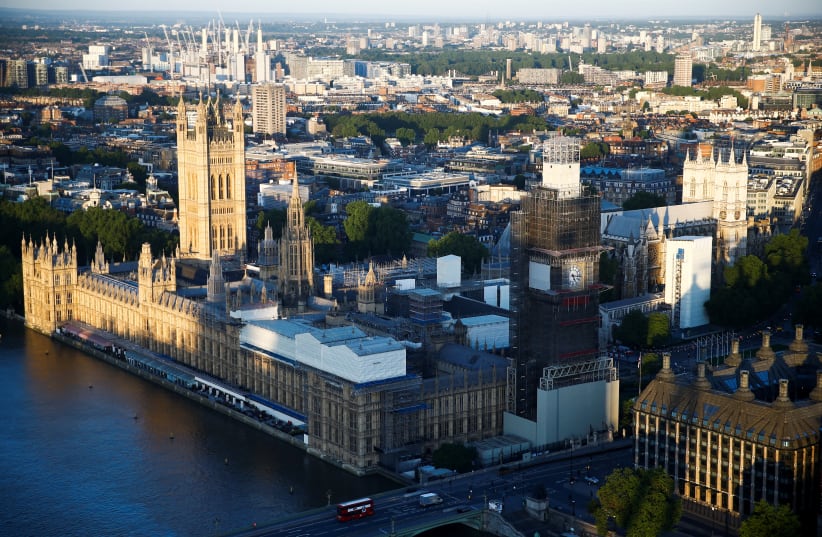Iran ranks behind Russia and China as the nation posing the greatest threat to British national security, according to senior intelligence officers, and the seizure of the British flagged Sten Impero only deepened concerns about Iranian aggression in MI5 and MI6.
Intelligence agencies believe that Iran has organized and funded sleeper terrorist cells throughout Europe, including the UK, and could order them to carry out attacks in response to an escalation in the Gulf conflict.
The cells are linked to the Lebanese Hezbollah terrorist group, according to The Telegraph. One such cell was uncovered by counter-terrorism police in 2015, with tons of explosive materials at businesses on the outskirts of London.
“Iran uses proxies and they have control of a network of individuals linked to Hezbollah," said one source to The Telegraph. “Iran has Hezbollah operatives in position to carry out a terrorist attack in the event of a conflict. That is the nature of the domestic threat Iran poses to the UK.”
Although MI5 and the Metropolitan Police are sure that raids in 2015 severely disrupted Iranian terrorist activities in the UK, there are still widespread cells throughout Europe.
The 2015 terror plot, which was only disclosed last month by The Telegraph, was described as "proper organized terrorism," with another source saying that enough explosive materials were stored to cause "a lot of damage."
The London-based cell was part of an international Hezbollah plan to lay the groundwork for future attacks, not an isolated cell, said sources to The Telegraph.
A group linked to the Iranian Revolutionary Guard carried out cyber attacks targeting British MPs and peers in 2017 and the UK Post Office, local government networks, private sector companies in 2018.
In 2018, Iran delivered half a ton of TATP explosives in diplomatic packages to a civilian plane that was supposed to be transferred to Paris to carry out an attack in the city, according to the British newspaper "Independent in Arabic."
According to the report, the plane arrived from Tehran to Geneva in June 2018, following an Iranian plan to carry out a terrorist attack during a meeting of the Iranian opposition. The attack was supposed to be carried out by an Iranian intelligence official who worked at the Iranian embassy in Austria since 2014, but French intelligence thwarted the attack after the authorities arrested a Belgian couple of Iranian origin who had the explosives in their car on their way to Paris.
British Prime Minister Theresa May was criticized by government officials for failing to agree to a US offer to join "Operation Sentinel," an international effort to monitor and protect naval traffic in the Arabian Gulf region.
While military officials saw the offer as an "excellent opportunity," the Prime Minister's Office "wasn't backing them up," out of concern that the UK could be seen as supporting America's hard approach to Iran, according to a government source, The Telegraph reported.
A government source told The Telegraph that British officials were "embarrassed" they had been "unable to look after our own," and criticized May for delaying a decision about joining Operation Sentinel.
Iain Duncan Smith, chairman of Boris Johnson's leadership campaign and the former Tory leader blamed Theresa May for making a "major miscalculation" after refusing an offer by the United States for "whatever assistance is necessary to protect British ships" in order to avoid being seen as aligned with the Trump administration.
In a letter to the United Nations Security Council on Saturday, Britain said that a British-flagged tanker seized by Iran was approached by Iranian forces when it was in Omani territorial waters.
"The ship was exercising the lawful right of transit passage in an international strait as provided for under international law," Britain's UN mission wrote to the Security Council. "International law requires that the right of transit passage shall not be impeded, and therefore the Iranian action constitutes illegal interference." The letter, seen by Reuters, was also sent to UN Secretary-General Antonio Guterres.
"Current tensions are extremely concerning, and our priority is to de-escalate. We do not seek confrontation with Iran," the letter read. "But it is unacceptable and highly escalatory to threaten shipping going about its legitimate business through internationally recognized transit corridors."
Britain called on Iran to release the Stena Impero tanker and told the council it was working to resolve the issue through diplomatic means.
Iran Foreign Minister Mohammad Javad Zarif stressed on Monday that Iran is not looking for conflict.
"It is very important for Boris Johnson as he enters 10 Downing Street to understand that Iran does not seek confrontation, that Iran wants normal relations based on mutual respect," said Zarif, referring to the new leader Britain's Tory Party who will become prime minister after Theresa May resigns, according to Radio Farda.
Yasser Okbi/Maariv contributed to this report.
